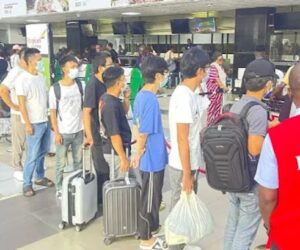In the fast-moving world of technology, a company’s name can be both an identity and a promise. But as markets evolve and products shift, many tech companies eventually outgrow their names. Sometimes the change is a response to expansion; other times it’s a pivot, a merger, or simply a need for a brand that reflects what customers now use the company for.
This trend has become more visible across Africa. From Nigeria to Kenya, South Africa, and beyond, several tech companies have rebranded to match new ambitions and realities. In this article, we highlight 22 notable examples from across the continent and explore why these changes happened.
| Current Name | Former Name(s) | Year | Notes |
| Moniepoint (Nigeria) | TeamApt | 2023 | Adopted the name of its strongest product to unify brand identity and double down on business banking/PoS terminals. |
| Rank (Nigeria) | Moni | 2025 | Rebranded after an acquisition; reflects a shift from small business financing/community lending to a more regulated, corporate banking direction. |
| Rivy (Nigeria) | Payhippo | 2025 | Pivoted from small-business loans to financing solar systems for small businesses lacking electricity. |
| Raenest (Nigeria) | Geegpay | 2024–2025 | Unified consumer and business offerings as it expanded globally, moving from freelancer payments to a broader financial services platform. |
| Lingawa (Nigeria) | TopSet | 2024 | Shifted focus from academic tutoring to African language learning. |
| Nomba (Nigeria) | Kudi | 2022 | Transitioned from a payments outfit to an omni-channel platform (operating system) for small businesses. |
| Grey (Nigeria) | Aboki Africa | 2022 | Expanded beyond basic currency exchange into foreign accounts and cross-border payments. |
| Bumpa (Nigeria) | Salescabal | 2021 | Changed to a simpler, more accessible brand for its e-commerce tools for small businesses. |
| Carbon (Nigeria) | Paylater | 2019 | Expanded from short-term loans/BNPL into a broader digital financial services platform (loans, bill payments, transfers, savings). |
| Caantin (Kenya) | TopUp Mama | 2023 | Rebranded to reflect its shift into a full procurement and supply chain solution for the restaurant industry. |
| Figorr (Kenya) | Gricd | 2023 | Expanded beyond agriculture into multiple sectors (healthcare, logistics); highlights its focus on data as its core “superpower.” |
| Roam (Kenya) | Opibus | 2022 | Shifted focus beyond buses to providing a wider range of electric vehicles and energy solutions across Africa. |
| AZA Finance (Kenya) | BitPesa | 2019 | Evolved from crypto transfers into a broader FX and treasury platform; avoided barriers associated with the ‘Bitcoin’ name. |
| Blu Label Unlimited (South Africa) | Blu Label Telecoms | 2025 | Expanded beyond telecoms into fintech, digital platforms, energy, and data. |
| iOCO (South Africa) | EOH | 2024 | Created a dedicated technology services brand as part of a major restructuring to signal a fresh start following governance scandals. |
| GoTyme (South Africa) | TymeBank | 2024 | Part of an alignment strategy with GoTyme Bank Philippines under the Tyme Group to unify its global digital banking identity. |
| Bloo Money (South Africa) | Moya Money | 2024 | Wanted a name that was playful and global to signal a renewed focus on innovation and differentiation in its freelance management system. |
| xneelo (South Africa) | Hetzner South Africa | 2019 | Changed to distinguish itself from its German licensor (Hetzner AG) and enable global expansion into other African markets. |
| Telecel Ghana (Ghana) | Vodafone Ghana | 2024 | Followed Telecel Group’s acquisition of a majority stake, consolidating its Pan-African footprint. |
| eShandi (Zambia) | PremierCredit | 2024 | Rebranded to reflect refreshed digital financial services and broader customer targeting with more local resonance. |
| 54 Collective (Pan-Africa) | Founders Factory Africa | 2024 | Evolved from an accelerator into a pan-African VC firm; the name is a nod to the 54 countries in Africa. |
| SehaLink (Morocco) | ta7halil.ma | 2024 | Expanded beyond laboratory testing to telehealth services; chose a more universal brand to scale across linguistic and cultural boundaries. |
Nigeria 🇳🇬
Moni – Rank (2025)
Moni, a startup that finances small businesses in groups across Africa, rebranded to Rank following its acquisition of AjoMoney and Zazzau Microfinance Bank. The new name reflects a more regulated, corporate banking direction. CEO Femi Iromini explained the thinking behind the change: “Rebranding from Moni to Rank marks a new chapter in our mission to make prosperity common. Rank is about rising together, building a financial system powered by community, trust, and shared progress.”
Payhippo – Rivy (2025)
When Payhippo, a Nigerian fintech company that provides small-business loans, became Rivy, its CEO, Dami Olawoye, said they made the change because they saw how many of their small-business customers didn’t have electricity. Instead of just giving loans, they started financing solar systems, letting these businesses buy solar and pay over time.
Geegpay – Raenest (2024–2025)
The company unified its consumer and business offerings under Raenest as it expanded globally. Originally focused on helping freelancers receive international payments, Geegpay’s pivot into a broader financial services platform required a name that could encompass both personal and business banking.
TopSet – Lingawa (2024)
TopSet, a Nigerian edtech startup that originally focused on academic tutoring, became Lingawa as it shifted to African language learning. CEO Frank Williams explained that “Lingawa isn’t just a word. It’s a blend of ‘Linguistic’ and ‘Wa’, meaning ‘Our’ in Yoruba. Together it represents ‘Our Language.’”
TeamApt – Moniepoint (2023)
TeamApt, a Nigerian fintech company providing business banking and payment solutions, adopted the name of its strongest product as it doubled down on business banking. By 2023, “Moniepoint” had become synonymous with point-of-sale terminals and business payments across Nigeria. The parent company realised that maintaining two separate identities (TeamApt for corporate communications and Moniepoint for customer-facing operations) created unnecessary confusion. The rebrand unified the company under the name that small business owners across the country already recognised and trusted.
Kudi – Nomba (2022)
When Nomba was announced as the new name, the leadership said they were becoming an omni-channel platform for businesses, not just a payments outfit. Its VP of Brand and Marketing said the company chose Nomba because it captured what really drives a business: its numbers. With that shift, the company was framing itself as a broader operating system for small businesses rather than a tool for basic transactions.
Aboki Africa – Grey (2022)
When Aboki Africa became Grey, the founders said the old name no longer matched what they were building. They were moving beyond basic currency exchange into foreign accounts and cross-border payments. CEO Idorenyin Obong said Grey is “solid and stable” and it is “here to stay.”
Salescabal – Bumpa (2021)
Salescabal, a company providing tools to help small businesses sell online, rebranded as Bumpa to make its brand clearer and more accessible. The founders noted that many SMEs found “Salescabal”- a startup that helps businesses build online e-commerce stores- too technical. Bumpa became a clearer brand for its e-commerce tools. The original name, while descriptive for those familiar with business terminology, created unnecessary friction for the company’s target market: small business owners who needed simple, accessible tools to sell online. Bumpa’s playful, memorable name removed that barrier to entry.
Paylater – Carbon (2019)
Paylater, a Nigerian company that originally offered short-term loans in a buy now, pay later model, rebranded as Carbon as it expanded into a broader digital financial services platform. The company now offers loans, bill payments, fund transfers, and savings products. The original name described what the company did (allow users to pay later), but it became restrictive as the platform added more features.
Kenya 🇰🇪
TopUp Mama – Caantin (2023)
The company rebranded to reflect its wider restaurant procurement operations. TopUp Mama began as a digital platform helping small restaurant owners (“mamas”) purchase airtime and pay bills. As the business evolved into a full procurement and supply chain solution for the restaurant industry, the name no longer conveyed the breadth of services offered. Caantin (evoking “canteen”) better represents the company’s focus on food service businesses.
Gricd – Figorr (2023)
When Gricd, a Kenyan company originally focused on agriculture, became Figorr, CEO Oghenetega Iortim said it changed the name because they’re no longer just about agriculture. “We work with multiple sectors, including agriculture, healthcare, and logistics. We also recognise that our real superpower is data, which is why we went with Figorr,” he said.
Opibus – Roam (2022)
Opibus, a Kenyan electric vehicle company that converts vehicles to run on clean energy, became Roam to show that it was moving beyond buses. The CEO, Filip Lövström, said it brings them closer to their goal of providing electric vehicles and energy solutions across Africa.
BitPesa – AZA Finance (2019)
Kenya-born BitPesa evolved from crypto transfers into a broader FX and treasury platform, prompting its rebrand to AZA Finance. Originally positioned as a Bitcoin-based payment solution, the company found that its cryptocurrency origins sometimes created barriers with traditional financial institutions and enterprise clients.
South Africa 🇿🇦
Blu Label Telecoms – Blu Label Unlimited (2025)
Blue Label Telecoms became Blu Label Unlimited as the company expanded beyond telecoms into fintech, digital platforms, energy, and data. The board felt “Telecoms” no longer reflected the range of their business. Adding “Unlimited” signals that the company is no longer constrained by one sector and highlights its broader ambitions.
EOH – iOCO (2024)
As part of a major restructuring, EOH created iOCO as its dedicated technology services brand. The name change followed governance reforms and a shift to a more agile services model. The rebrand came during a particularly challenging period for EOH, which faced governance scandals and needed to rebuild trust. Creating iOCO as a distinct brand allowed the company to signal a fresh start for its technology services division while distancing it from the parent company’s troubled past.
TymeBank – GoTyme (2024)
TymeBank, a South African digital bank offering fully online banking services to individuals and small businesses, began shifting to the GoTyme brand as part of an alignment strategy with GoTyme Bank Philippines under the Tyme Group. Executives described the change as an effort to “bring our global digital banking identity under one family.”
Moya Money – Bloo Money (2024)
Moya Money became Bloo Money in May 2024. The founders said they wanted a name that stands out and feels playful. “Bloo” works globally, is easy to say, and reflects a fresh, creative identity. Their core product, a freelance management system, hasn’t changed, but the new name signals a renewed focus on innovation, differentiation, and putting freelancers first.
Hetzner South Africa – xneelo (2019)
The web hosting company changed its name to distinguish itself from the German Hetzner AG and to support global expansion. Operating under a licenced name created limitations on how the South African company could position itself internationally. The rebrand to xneelo gave the company full control over its brand identity and cleared the path for expansion into other African markets without geographic constraints.
Other African countries
Beyond the major tech hubs, companies across the continent have also undergone significant rebrands as markets evolve and business models mature.
Vodafone Ghana – Telecel Ghana (2024)
Following Telecel Group’s acquisition of a majority stake, the company adopted Telecel Ghana. Leadership described the rebrand as “the beginning of a new chapter of digital expansion in Ghana.” The change marked the end of Vodafone’s brand presence in Ghana and represented Telecel Group’s strategy to consolidate its Pan-African telecommunications footprint under a unified brand.
PremierCredit (Zambia) – eShandi (2024)
The lending platform rebranded as eShandi to reflect its refreshed digital financial services and broader customer targeting. “eShandi” carries more local resonance in Zambian markets while signaling a move toward a more comprehensive digital finance offering beyond simple lending.
Founders Factory Africa – 54 Collective (2024)
The accelerator evolved into a pan-African VC firm. CEO Bongani Sithole said, “We have rebranded to 54 Collective. This transformation signifies a strategic evolution aimed at amplifying support for African entrepreneurs… The name is a nod to the 54 countries that make up Africa.”
ta7halil.ma – SehaLink (2024, Morocco)
The digital health platform expanded beyond laboratory testing to telehealth services, prompting the rebrand. The original name, while working well in Morocco’s French and Arabic-speaking market, didn’t translate easily for potential expansion into other African regions. SehaLink offers a more universal health-focused brand that can scale across linguistic and cultural boundaries.








